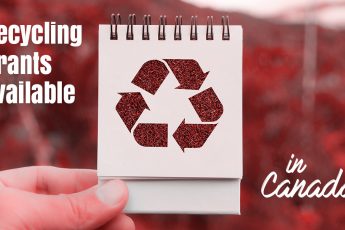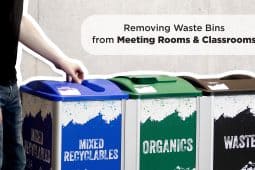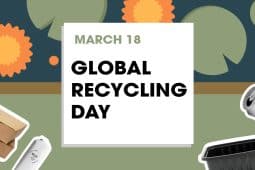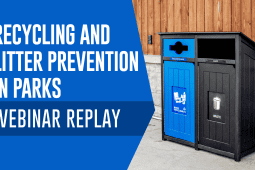Can one person make a difference? Absolutely. Every simple step you make towards zero waste results in a positive contribution to the environment in some capacity.
What is Zero Waste/What does Zero Waste mean?
According to the Zero Waste International Alliance, “Zero Waste is a goal that is ethical, economical, efficient and visionary, to guide people in changing their lifestyles and practices to emulate sustainable natural cycles, where all discarded materials are designed to become resources for others to use.”
“…Zero Waste means designing and managing products and processes to systematically avoid and eliminate the volume and toxicity of waste and materials, conserve and recover all resources, and not burn or bury them. Implementing Zero Waste will eliminate all discharges to land, water or air that are a threat to planetary, human, animal or plant health.”
What Does It Mean for my Organization to Become Zero Waste?
Zero Waste means to produce, well, no waste! In a perfect world, it’s just that simple, but let me be a little more practical here and dive into all the nitty-gritty details of becoming a zero-waste organization.
The goal of zero-waste is to reduce, reuse, and divert as much material as possible –and in doing so preventing these materials from reaching the landfill, being incinerated, converted from waste to energy, or ending up in the environment. By going zero-waste, you are eliminating all discharges to land, water, or air that are a threat to the health of our planet and the species that live on earth.
Going zero-waste supports a circular economy and the idea that all materials should be designed and managed to become resources for others to use at their end of life. As a zero-waste organization, you will commit to consistently reassessing your system and finding opportunities to reduce your waste generation and increase diversion opportunities whenever possible.
Specific third-party certifications, such as TRUE Zero Waste as an example, will accept a minimum 90% diversion rate to achieve zero-waste certification. Although 90% is accepted, the end goal of “zero-waste” is to strive to divert 100% of materials whenever possible, keeping in mind however, not all materials are recoverable.
Let’s start with your why.
Why Go Zero Waste?
The average American sends 4.4lbs of trash to the landfill every single day! When you multiply that by the number of days per year, you’re looking at about 1,606 lbs produced annually, per person. With the average person spending most of their days at work, your organization could be accumulating the majority of this waste generation. This excess waste can cost you lots of money and have several other negative impacts within your organization.
Choosing zero-waste means moving forward as a sustainable organization. And these changes for the future come with a lot of great results. Let’s dive into some of the good stuff!
Cost Savings
Going zero-waste can help your cost-savings as it reduces the amount of money spent on waste pick-up (recycling and organics pick-up is typically cheaper than waste by weight). It also saves money because society as a whole is paying for this excess waste generation in environmental costs, such as greenhouse gas emissions, contaminated soil, and water, health effects of pollution & more.
Another factor to consider is that you can earn revenue on your recyclable commodities in some instances!
Environmental Contributions
By increasing your diversion rate through recycling and organics collection, you are also helping to save several vital resources such as water, land, trees – you name it! You save energy by diverting materials as you eliminate the need for the production of new materials.
Brand Responsibility
Sustainability is a rising trend that is only growing in popularity. Sharing your zero-waste plan and goals externally is going to demonstrate your commitment to environmental responsibility and your transparency as a brand; because you don’t just talk the talk, you also walk the walk! Consumers are more likely to support a brand that they care about – and one they feel like they are making a positive difference with, together.
It is also a great opportunity internally for employees or volunteers of your organization to be a part of something greater. Getting employees engaged in your zero-waste goals will make it a fun and positive experience for your organization.
Ok – You’ve Convinced Me To Go Zero-Waste! What Do I Do Now?
If you want to go zero-waste, you need to develop a realistic plan or strategy. It’s not something that successfully happens overnight – although we can dream, am I right?
Access Your Starting Point
Look into the criteria of zero-waste certifications and see how your program compares. Perform a waste audit yourself or have a third-party organization come in and generate numbers that will give you a baseline of how your current diversion program is functioning.
Once you know where you’re at, you can implement strategies and goals that will move you towards where you want to be. Third parties can provide you with recommendations that when implemented, will help you achieve your goals.
It’s also important to note that diversion tracking is a critical step in quantifying materials included in your zero-waste policy. This highlights the materials that are traveling through your facility and uncovers opportunities for improvement. You would want to acquire at least 12 months of weight data and material values for all waste streams. These quantities are critical in establishing a baseline, which then you are able to measure your progress and communicate how zero waste efforts are making a difference.
Education and Outreach
Educate staff or visitors of your organization internally, so they are aware of and understand the new program or policies you are implementing. Outreach and educational events can get employees super engaged and excited about your organization’s plans!
Put Policies In Place
Set a zero-waste Policy as well as a time to achieve your zero-waste goal, ‘ i.e., we want to achieve zero-waste by 2025′ and make sure to also include your strategies or goals of how you will achieve zero-waste within this policy.
Get Certified – Once you’ve started to achieve some of your goals, reach out and find a company that can provide you with a third-party certification.
Are There Any Other Ways I Can Make An Impact?
Yes – 100%! Let’s talk about simple steps that can be made at the individual level. One of my favorite quotes is,
“Never doubt that a small group of thoughtful, committed, citizens can change the world. Indeed, it is the only thing that ever has.” – Margret Mead
Can one person make a difference? Absolutely. Every simple step you make towards zero-waste makes a positive contribution to the environment in some capacity. Never be naïve to the fact that your actions inspire others. Making individual changes can inspire your friends, family, and co-workers to adopt similar habits.











